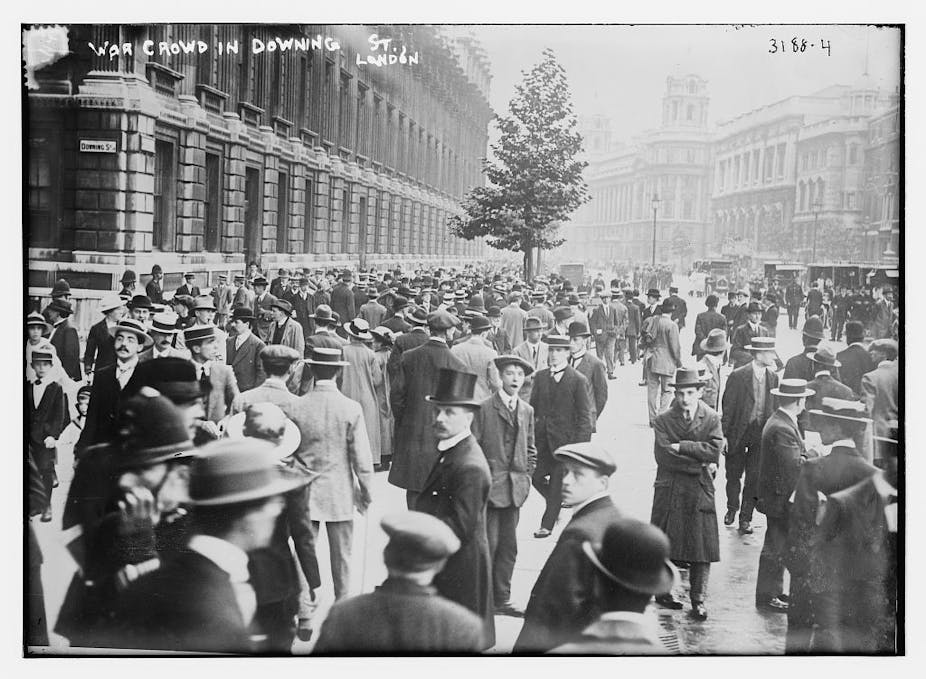The audio drama evangelist and bloodhound in me has caught scent of the fragrant odour of a renaissance. The immense popularity of Serial, with its style of journalistic storytelling and dramatic sensation has been revivifying. What felt like the slow death of radio to many has been stopped in its tracks with the advent of podcasts, which has spurred a flurry of original audio drama, developed from the likes of Audible.
Meanwhile the UK’s cultural establishment icon, the BBC, has been exceeding its audio drama brief. That hoary old soap, the Archers, continues to bubble a bizarre and fantastic rural Midland farming fantasy through weekday 13-minute episodes, and hour-long weekly omnibuses that are ravenously consumed in their podcast form. The Archers has been downloaded more than 63.4m times since its podcast was launched in 2007.
Radio drama is no longer so ephemeral, and nowhere is this seen more than with the BBC. One series in particular demonstrates this.
Home Front
December sees BBC Radio 4’s World War I drama Home Front returning for a second series. Had this been a television production, I have no doubt it would be a weekly talking point at the dinner table and bus-stop queue, and wowed in the media.
The concept behind Home Front is reproducing the everyday experience exactly 100 years ago to the day of each episode’s broadcast. All the characters and stories are fictional, but the dramaturgical setting is firmly rooted in the factual concept of Great War Britain.
The quality of writing, directing and production has been astounding. I’d rank it alongside ITV’s iconic Family At War TV series from the 1970s, the BBC’s 1960s Forsythe Saga, or Upstairs Downstairs.
The BBC have described it as “an epic drama series – and one of the largest ever radio drama commissions,” and they aren’t exaggerating. This is an exceptionally ambitious and creative show, with around 600 episodes running for the full four years of centenary commemoration of the 1914-18 war. This means it will be with us until 2018.
I have to concede that there is undoubtedly Great War overkill going on at the moment. Some aspects of World War I’s commemoration do verge on the grotesque and obscene. To me it’s odd that we’re obsessing so much about a global conflagration that was so ugly and destructive.
But the elegance and sensibility of Home Front’s resumption of their series overcome my natural suspicion – this is a programme that is more than anything else subversive and questioning.
The first series focused on the seaside resort of Folkestone, which quickly turned into a frontline port, seeing troops and supplies off to France and disembarking war refugees and casualties.
The narrative is constrained by real events but within this fictional frame, it is woven through, such as the romantic intimacy of a servant and a German waiter who is then hunted down as an “alien hun”.
Or there’s the vicar, who challenges the suffocation of the bourgeoisie by falling in love with his Sunday school-teacher while living in an unconsummated marriage.
Home Front introduces and develops powerful themes of humanitarian sensibility across social and generational strata. So the perspective of young children is explored, presenting them as imagining or actually experiencing the paranoid spy mania of the time. When two young boys disappear the tragedy is invested, from episode-to-episode and week-to-week, with the fear they have drowned in the Channel trying to swim to France, been abducted by enemy agents, stowed away on a troop ship or ferry train to London.
The quality of the writing puts most of the screenplay scripting of contemporary television drama to shame. Unsurprising perhaps – the authors rank among Britain’s leading playwrights. The Prix Italia winning Katie Hims leads a team including Sebastian Baczkiewicz, Sarah Daniels and Shaun McKenna.
They also have cast an exquisite company of actors. Michael Bertenshaw in particular takes the local town establishment figure of Gabriel Graham on a heart-breaking journey from pre-war pomposity and authority to grief-stricken breakdown when he loses his beloved son Freddie in the first weeks of conflict.
I was enthralled and moved at the depiction of his descent into apparent disobedience and delinquency when he struggled to come to terms with the annihilation of his only son. The blurting out of a poem at a civic meeting, going on a whisky-soaked bender in a working class dive, and then so charmingly enabling the adventure of two young children determined to reunite a sobbing Belgian refugee, forlornly pacing the seafront, with his missing wife.
What better way to think about the war on its centenary. Home Front encourages the consideration of the war as a day-to-day reality rather than an episode long gone, a self-contained period of time. Ironically, it is through its fiction that the reality of war is brought to the fore.
Season two is about to start. Jump on board.

